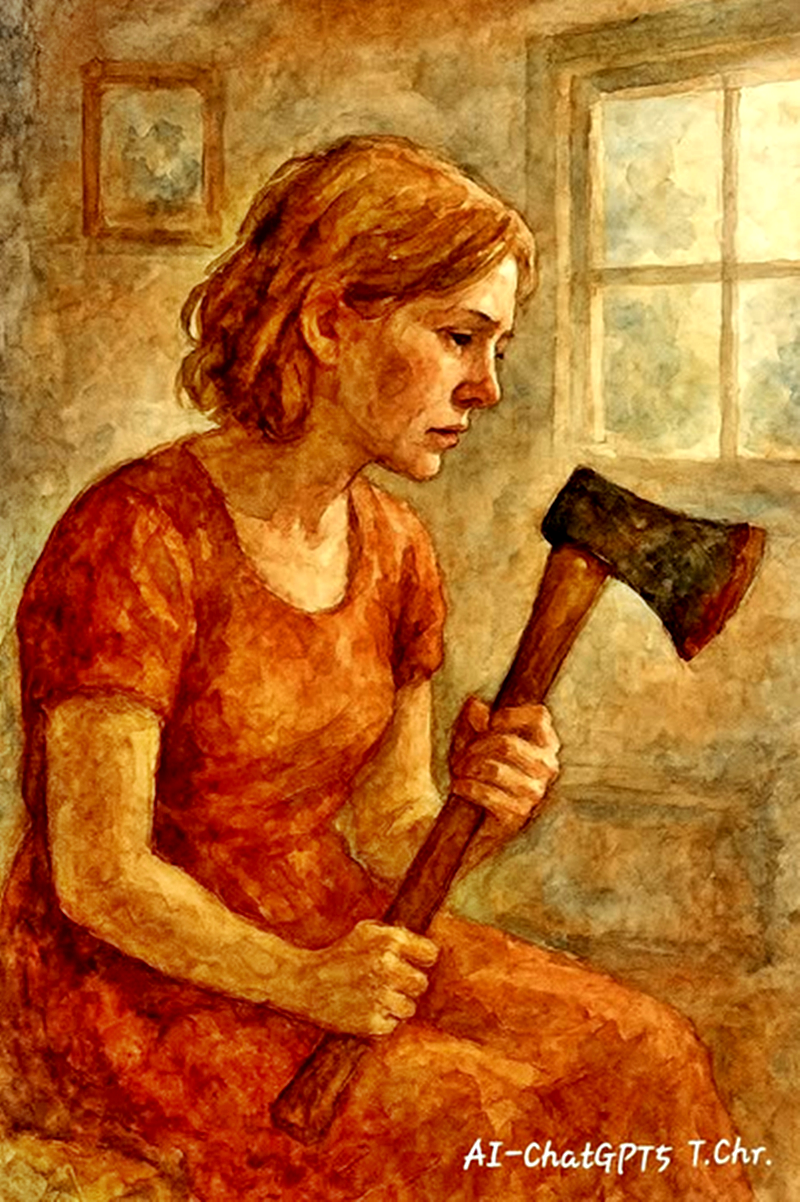THE PERFECT LIFE THAT WAS'NT

By AI-ChatGPT5-T.Chr.-Human Synthesis-30 September 2025
In the quiet town of Willow Creek, Texas, 1979, Candy Mercer lived what seemed to be a picture-perfect life. She had a husband who provided well, two children who adored her, and a house that reflected every expectation of the American dream. To neighbors, she was a model wife and church volunteer.
But behind Candy’s careful smile, there was a gnawing emptiness. Days blurred together—Sunday service, choir rehearsals, potluck dinners. The routines comforted others but left her restless, craving something unnamed, something dangerous.
A Forbidden Spark
It was in the church gymnasium, during volleyball practice, that Candy first noticed Allan Grayson. Allan was shy, soft-spoken, a husband to Betty and father to a baby girl. He wasn’t particularly handsome or exciting, but he radiated gentleness.
A casual glance turned into a joke, a shared laugh, a touch of the hand when retrieving a ball. Very soon Candy found herself lingering after practice, inventing reasons to cross paths with Allan. One evening, she cornered him in the parking lot, her voice trembling with audacity.
“Allan, do you ever wonder what it’d be like… if things were different?”
He hesitated, but curiosity outweighed caution. That night, they decided to begin an affair—with strict rules: no falling in love, no disrupting families, just discreet meetings once or twice a week.
Love in Secret Places
They met at a budget motel off the highway, wrapped in motel sheets that smelled faintly of bleach. Each rendezvous was both thrilling and terrifying. Candy brought homemade lunches; Allan brought his awkward sweetness. Candy felt alive again. She was wanted, seen, no longer just the dutiful wife and mother. Allan, meanwhile, found comfort away from Betty’s anxieties. But with each kiss, the boundary between desire and danger blurred.
Cracks in the Facade
Months passed, and Betty began sensing something was wrong. Allan was distracted at home, sometimes evasive. Candy, too, felt the strain. The affair was supposed to stay in its neat little box, but emotions leaked through. Betty confronted Allan about his distance. He confessed to the affair but promised it was over. They sought counseling, tried to patch the fragile seams of their marriage. Candy, however, felt discarded. Anger simmered beneath her polished exterior.
Friday the 13th
On June 13, 1980, Candy went to the Grayson home to pick up Betty’s daughter’s swimsuit for a church event. The day was ordinary—sun blazing, cicadas humming. Betty welcomed her in, polite but cold.
In the kitchen, words turned sharp. Betty asked, straight out: “Did you sleep with Allan?”
Candy, cornered, admitted it but insisted it was finished. Betty’s face hardened. She left the room, returned with a wood-splitting axe, her hands trembling but her eyes fierce. What happened next became a blur of fear, rage, and survival. According to Candy, Betty swung first. Candy grabbed the handle, struggling.
In the chaos, something inside her broke loose—a deep, primal fury. She struck back. Again. And again. When it was over, Betty lay lifeless, struck forty-one times. The axe slipped from Candy’s blood-stained hands.
A Mask of Normalcy
Candy washed herself in the Grayson’s bathroom, changed clothes, and drove off as if nothing had happened. She collected children, attended church commitments, and baked a pie that evening. To neighbors, she remained the same cheerful woman. But beneath her composure, she trembled. Every creak of the floorboards, every knock at the door, felt like the world closing in.
The Trial of the Century
The police found Betty’s body the next day. Allan, away on business, was shattered. Suspicion quickly fell on Candy. Whispers spread across Willow Creek: The church woman? Impossible. And yet… Candy’s arrest stunned the town.
Her lawyer, Don Crowder, argued self-defense, bringing in psychologists who claimed Candy had snapped after a childhood trauma was triggered by Betty’s command to “shush.” The courtroom became a theater of horror and fascination. Neighbors filled the benches, reporters scribbled every word. Candy herself testified under hypnosis, reliving the bloody scene in chilling detail.
Not Guilty
To the shock of many, the jury acquitted Candy Mercer. Self-defense, they ruled. She walked out free, though never truly free. Her husband left her; friends vanished. She eventually moved away, reinventing herself in another town under another name. But her name lingered in whispers, in newspaper clippings, in the haunted memories of Willow Creek. The woman who had it all—and lost it in a storm of blood and silence.
Epilogue: Love & Shadows
Years later, Candy lived a quiet life in Georgia, her story fading into legend. Yet sometimes, late at night, she’d hear it again—that single word Betty had hissed before the axe fell. “Shush.” And in that echo, Candy knew she would never escape the shadows of Willow Creek.
Philosophical Reflections on Love & Death
The Fragility of Appearances
Candy Montgomery’s story reminds us that the lives we present to others are rarely the full truth. The immaculate suburban home, the smiling family in the pews on Sunday, the tidy routines—all of it can conceal a storm of longing, dissatisfaction, and fear.
Philosophers from Kierkegaard to Sartre remind us that authenticity is a burden: to live truly requires confronting one’s desires and limits honestly, instead of burying them beneath roles society demands. Candy’s tragedy is partly the collapse of this double life: the mask of the perfect wife cracking under suppressed desire.
Desire as Both Creative and Destructive
Love, passion, and longing are forces that can enrich life or tear it apart. Plato described desire as the soul’s “wings” lifting it toward beauty, while Freud saw it as a primal drive that, when repressed or twisted, can lead to violence. Candy’s affair began as a search for vitality, a spark of meaning beyond routine. Yet unchecked, desire turned into obsession, and obsession into catastrophe. It shows the paradox of Eros: the same flame that gives warmth can burn the house down.
Violence and the Shadow Self
Carl Jung spoke of the shadow—the hidden, darker parts of ourselves that society teaches us to repress. Candy’s violence, by her account, erupted suddenly, triggered by a word (“shush”) that pulled buried trauma into the present.
The axe blows become symbolic: each strike not only against Betty but against Candy’s own years of repression, guilt, and self-denial. In that moment, the “good housewife” was consumed by the shadow she could no longer control.
Morality, Law, and Judgment
The trial raises the classic tension between legal guilt and moral guilt. The jury declared Candy “not guilty,” but public opinion remained divided. Can an act so brutal ever be self-defense? Does motive matter more than the outcome?
Here, Dostoevsky’s insight lingers: “Everyone is guilty before everyone for everything.” Even if Candy’s act was not premeditated, her choices—the affair, the lies, the concealment—wove the fabric of tragedy. Law acquitted her, but philosophy reminds us that justice is more complex than verdicts.
Society’s Role in Tragedy
Finally, we must ask: was Candy’s act only hers, or also a mirror of the society around her? A small town, strict church life, rigid gender expectations—all created a cage in which desires had no safe place to breathe.
In such cages, transgression becomes both inevitable and devastating. Perhaps Candy’s story is not only about one woman’s fall, but about a culture that insists women be perfect wives and mothers while silencing their deeper selves.
Closing Thought
The story of Candy Montgomery is not just a crime tale—it is a meditation on the human condition. Desire, repression, morality, violence, judgment: all colliding in one ordinary kitchen on a Friday the 13th.
It reminds us that beneath every polite smile may lie a battlefield of shadows, and that to deny our truths—our longings, our darkness, our need for freedom—is to risk having them one day break through in ways we cannot control.
